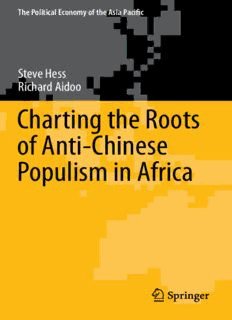
Charting the Roots of Anti-Chinese Populism in Africa PDF
Preview Charting the Roots of Anti-Chinese Populism in Africa
The Political Economy of the Asia Pacific Steve Hess Richard Aidoo Charting the Roots of Anti-Chinese Populism in Africa The Political Economy of the Asia Pacifi c Series Editor Vinod K. Aggarwal More information about this series at h ttp://www.springer.com/series/7840 Steve Hess • Richard Aidoo Charting the Roots of Anti- Chinese Populism in Africa Steve Hess Richard Aidoo University of Bridgeport Coastal Carolina University Bridgeport , CT , USA Conway , SC , USA ISSN 1866-6507 ISSN 1866-6515 (electronic) The Political Economy of the Asia Pacifi c ISBN 978-3-319-17628-4 ISBN 978-3-319-17629-1 (eBook) DOI 10.1007/978-3-319-17629-1 Library of Congress Control Number: 2015943311 Springer Cham Heidelberg New York Dordrecht London © Springer International Publishing Switzerland 2015 T his work is subject to copyright. All rights are reserved by the Publisher, whether the whole or part of the material is concerned, specifi cally the rights of translation, reprinting, reuse of illustrations, recitation, broadcasting, reproduction on microfi lms or in any other physical way, and transmission or information storage and retrieval, electronic adaptation, computer software, or by similar or dissimilar methodology now known or hereafter developed. T he use of general descriptive names, registered names, trademarks, service marks, etc. in this publication does not imply, even in the absence of a specifi c statement, that such names are exempt from the relevant protective laws and regulations and therefore free for general use. T he publisher, the authors and the editors are safe to assume that the advice and information in this book are believed to be true and accurate at the date of publication. Neither the publisher nor the authors or the editors give a warranty, express or implied, with respect to the material contained herein or for any errors or omissions that may have been made. Printed on acid-free paper S pringer International Publishing AG Switzerland is part of Springer Science+Business Media (www.springer.com) To our children: Adaline Hess, Joel and Jairus Aidoo. Contents 1 The Changing Shades of China–Africa Relations in the Twenty-First Century: Different Regimes, Non-interference, and Anti-Chinese Populism in Africa ...................... 1 1.1 Patterns and Variations in African Public Opinion Towards China .... 4 1.2 Complementary and Competing Economic Relations ....................... 12 1.3 Regimes and Political Opportunities ................................................. 15 Part I Open and Electoral Democratic Regimes 2 King Cobra and the Rise of Anti-Chinese Populism in Zambia ........... 25 2.1 The Political Landscape ..................................................................... 26 2.2 Chinese Involvement in Zambia ........................................................ 32 3 The Politics and Economics of Democracy and Anti-Chinese Sentiment in Ghana .................................................................................. 41 3.1 Political Economic Development ....................................................... 42 3.2 China in Ghana: An Evolution of Interests ........................................ 47 3.3 Anti-Chinese Sentiment in Ghana ..................................................... 50 4 The Contours of Complexity Between China and South Africa ........... 57 4.1 South Africa’s Celebrated Political Evolution ................................... 58 4.2 Chinese Involvement in South Africa ................................................ 64 4.3 Popular Reactions to Chinese Engagement ....................................... 69 Part II Closed Authoritarian Regimes 5 The Political Staleness of China–Ethiopia Relations ............................. 79 5.1 The Political Landscape ..................................................................... 80 5.2 Chinese Involvement in Ethiopia ....................................................... 85 5.3 Popular Reactions to Chinese Engagement ....................................... 92 vii viii Contents 6 Oil and Authoritarianism: The Sino-Angolan Relationship ................. 109 6.1 The Political Landscape ..................................................................... 110 6.2 Chinese Involvement in Angola ......................................................... 115 6.3 Popular Reactions to Chinese Engagement ....................................... 122 7 Conclusion: Anti-Chinese Populism and the Emergence of China’s Adaptive Engagement with Africa ........................................ 133 7.1 Beijing’s Foreign Policy in Africa’s Changing Political Landscape ............................................................................ 136 7.2 Ghana ................................................................................................. 139 7.3 South Africa ....................................................................................... 141 7.4 Angola ................................................................................................ 144 7.5 Ethiopia .............................................................................................. 146 7.6 Zambia ............................................................................................... 149 7.7 Concluding Remarks .......................................................................... 152 Abbreviations ANC African National Congress BRICS Brazil, Russia, India, China, and South Africa CASA Chinese Association of South Africa CDB China Development Bank CELU Confederation of Ethiopian Labor Unions CIF China International Fund CNMC China Nonferrous Metal Mining Group CNOOC China Offshore Oil Corporation COPWE Commission for Organizing the Party of the Working People of Ethiopia CCP Chinese Communist Party CPP Convention People’s Party CUD Coalition for Unity and Democracy ELF Eritrean Liberal Front EPLF Eritrean Popular Liberation Front EPRDF Ethiopian People’s Revolutionary Democratic Front ERP Economic Recovery Program FNLA National Liberation Front of Angola FOCAC Forum on China Africa Cooperation FDD Forum for Democratic Development GNPC Ghana National Petroleum Corporation GIPC Ghana Investment Promotion Council HIPC Heavily Indebted Poor Countries IFIs International Financial Institutions IFP Inkatha Freedom Party MEISON All-Ethiopia Socialist Movement MMD Movement for Multi-Party Democracy MPLA Popular Movement for the Liberation of Angola NCP National Congress Party ix
Description: